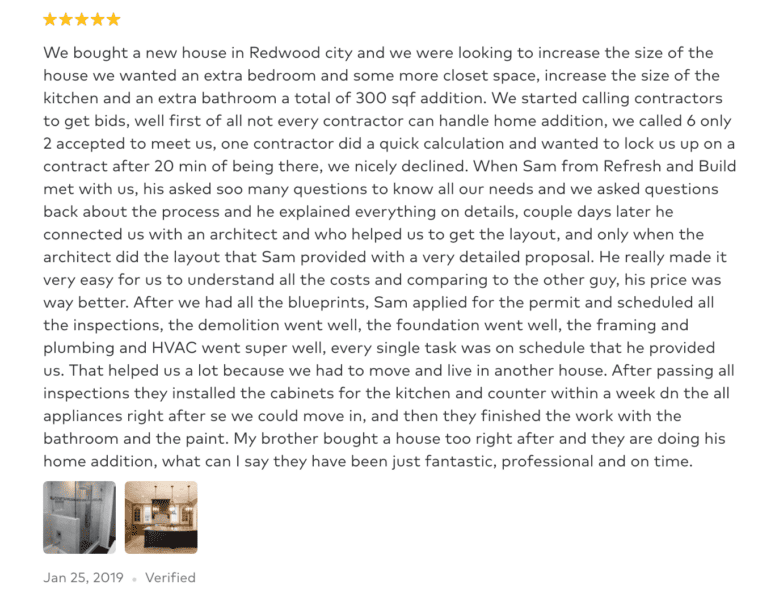How to Find Home Remodelers Who Won’t Leave You Hanging: 7 Tips to Avoid Scammers
- Published on
- 3-5 min read
-
Corinne Rivera Staff WriterCloseCorinne Rivera Staff Writer
Corinne is a journalist with a passion for real estate, travel, and visual arts. She has a B.A. in Broadcast Journalism from San Francisco State University. When she’s not creating content, you can find her exploring open houses, watching HGTV, or redesigning her apartment... again.
Scams in the home improvement space are no joke. Since 2015, the Better Business Bureau has received reports of over 1,200 home improvement scams and counting. One victim who reported losing $80,000 to a fake business in Sept. 2018 wrote in a BBB complaint:
“Offer to build a back house. Had to take out loans for the project. They started but never finished. It has been months since they have returned to project. They disconnected lines for the business and personal lines. Took all loan money.”
This is every homeowner’s worst nightmare and even more devastating if you’re selling the house and have zero time or money to waste. Providing upfront funds is one huge risk; another is sloppy work that violates building codes or threatens people’s safety. Home inspectors will notice remodeling jobs gone wrong (even if you don’t) and give buyers a one-way ticket out—no questions asked.
As you work to get your home ready to sell, every decision and dollar you spend affect your bottom line. Home remodels need to be carefully executed and it starts with who you hire.
We researched everything about the best and worst home remodelers—from what you should know about license and insurance to what a proper bid looks like. Let’s break down all of the unknowns so you don’t end up as another scam victim.

Gut check: Are you sure about that home remodel?
“Major remodels are not something that you need to be doing prior to selling,” says Zach Otten, who has sold over 83% more properties in Denver than the average agent.
According to a LightStream Home Improvement Survey, 73% of homeowners plan to renovate their home this year. If you’re unsure whether you should renovate your home before you sell it, look at how much of the cost will be recouped in the resale value.
Smaller home maintenance projects typically have a higher return on investment. For example, the National Association of Realtors’ Remodeling Impact Report reports that kitchen upgrades and renovations only return up to 62% of the cost. Before you remodel your kitchen, consider some budget-friendly updates that are proven to increase your home’s value.
Remodeling Magazine’s 2018 Cost vs. Value Report lists the following home renovations as the best return on investment:
- Replace your garage door. Cost recouped: 98%
- Add manufactured stone veneer siding. Cost recouped: 97%
- Replace your front door with a steel door. Cost recouped: 91%
- Add a wood deck. Cost recouped: 82%
- Do a minor kitchen remodel. Cost recouped: 81%
- Replace siding. Cost recouped: 76%
- Replace windows with new vinyl windows. Cost recouped: 74%
- Remodel bathroom with a universal design. Cost recouped: 70%
At the end of the day, Otten says your remodeling decision ultimately depends on when you plan to sell your home.
“If you’re going to be in the house for the next 10 years, remodel to your taste. But if you plan to sell in the next year or two and your goal is to get the highest return, do it to the taste of the buyer pool in your area,” he says.
That’s where the advice of a top real estate agent comes in. The highest-performing agents in your area can tell you exactly what local buyers look for, whether it’s the farmhouse kitchen look or all beige everything. So before you gut your traditional kitchen for statement blue cabinets, talk to a top real estate agent to see what style buyers in your area gravitate towards.

7 pro tips to find the best home remodeler in town
You’re sure a remodeling project will help your house sell for more money, so it’s time to hire a remodeler you can trust.
Here’s how to find the best remodeler in your area when you need to get your home ready to sell.
1. Get a list of referred remodelers from family and friends.
Word of mouth is one of the best ways to find the perfect person for your home remodels. Talk to a network of people you trust and ask about remodelers they’ve had good (or bad) experiences with.
Here are some questions to ask your friends and family when they recommend a home remodeler:
- What project did you have done?
- How much did you pay upfront?
- How long did the project take?
- Did the remodeler have insurance, permits, and a contract for the project?
- Were you kept up to date on the progress of the project?
- Was there ever a time you felt uncomfortable with their work?
- How has the project held up since it’s been completed?
2. Verify each remodeler’s credentials online.
Remodeling horror stories typically have the same things in common: the “remodeler” is an unlicensed fraud who promises special pricing if you pay in cash up front. The National Association of Home Builders warns that these scammers most often lurk in places affected by natural disasters.
Every remodeler that you consider should have the following resources on hand to verify their integrity:
- A state contractor license.
Each state has a State Licensing Board for contractors, so check to make sure the home remodeler you consider is licensed. But be aware that just because a remodeling contractor is licensed, it doesn’t mean they’ll do the best work.Some states don’t even require contractors to obtain licensing and the requirements and rules for contractors vary between states.The bar to obtain contractor licensing is low in some states, so make sure the contractor has an outstanding reputation as well. Check with your state consumer protection offices to see the requirements for contractors and home remodelers.
- Shining client reviews.
Any professional contractor should have customer reviews to show that they are dependable and efficient. Past reviews will show that they are capable of completing a project similar to yours without any drawbacks.
You want reviews that are more than just, “They did a good job”. Here are some things to look for as you read home remodeler reviews:
- The client describes the project and timeframe.
- The remodeler was communicative and efficient throughout the process.
- The pictures of the finished project are similar to your own project goals
- The client would hire the remodeler again or refer them to their family and friends.
- The remodeler has at least 5 positive reviews.
For example, this client review fits the bill for a qualified home remodeler:
- Liability and insurance coverage.
Your choice remodeler should do everything by the book, which includes protection in the event of an accident. Ask for copies of their insurance and double check that they’re current to prevent liability in the event of damage or injuries.Make sure their insurance covers their workers and request additional insured certificates for yourself. This will give you extra protection in the event of an accident, and a reliable home remodeler should have no issue adding you to their insurance policy.
- A written contract.
Before the start of any project, a remodeler should present a written contract with the terms of the project, estimated cost, and projected timeline.Without a contract, the remodeler isn’t legally bound to your service in any way—which means they can take off in the middle of the remodel with no repercussions.
3. Request bids from at least 3 qualified remodelers.
Once you have a list of recommended remodelers, connect with at least 3 remodelers in your area and request a bid. This is your chance to see exactly how a home remodeler does business.
Here is everything that a bid should include:
- A cost breakdown including materials, permits, labor, demolition, and possible surprises
- Payment specifications and policies
- Copies of licenses and insurance
- A project timeline and roadmap
- Subcontractors needed for the project
For large remodeling projects, the home remodeler should set up a meeting for the necessary subcontractors to meet with you and visit your home in order to provide the most accurate bid. This will help you fully understand what will go into the project and give you the chance to ask questions upfront.
If a contractor just gives you a quick cost estimate in your first meeting, don’t take it at face value, sign anything, or exchange any funds. A good one will take about a week to conduct a formal proposal.
4. Be careful how much you pay upfront.
It’s common for home remodelers to request a deposit for the project. They use this deposit to purchase the necessary tools and materials they need to start the remodel, and then deduct it from the total cost once the project is complete.
However, if a contractor requests more than a 10% down payment, be wary. Some states have laws against large down payments to contractors.
The states that hold these laws are:
- California (no more than 10% or $1,000)
- Massachusetts (no more than ⅓ of the cost)
- Maine (no more than ⅓ of the cost)
- Maryland (no more than ⅓ of the cost),
- Nevada for pools and spas (no more than 10% of the cost)
- Pennsylvania (no more than ⅓ of the cost)
- Tennessee (no more than ⅓ of the cost)
- Arizona for pool or spa (not more than one thousand dollars)
To see if there are contractor laws in your state, check with your state contractor licensing board.
If your state doesn’t have such laws in place, request a list of the materials needed for the job. Then, go to HomeDepot or Lowe’s and calculate the total cost of these materials. Add 10% to the total as a buffer. If your home remodeler is requesting significantly more than that amount, take it as a red flag and consider hiring a different home remodeler.
5. Verify their design skills match the buyer pool in your area.
Your real estate agent knows that buyers in your area love modern tile work in bathrooms and kitchens. So, you need a home remodeler who specializes in tile design.
Ask your remodeler candidates for photos of previous work. Make sure they are comfortable taking on the design you and your real estate agent have envisioned.
6. Make sure they’re on the same page with budget and timeline
Low to mid-range remodels are a better investment for homeowners preparing to sell, so you need to make sure your remodeling contractor isn’t set on pushing your purse strings.
Before the work starts, create a documented design plan with specific materials. For example, if you are updating your kitchen, choose the exact hardware you want. Or if you are repainting the interior, make sure you know the specific color swatch. Include the specifications in the work documents and don’t leave anything to chance.
Your contractor should stick to the costs and time frame that was agreed to at the beginning of the process. Any extra costs or delays that come up are red flags. If you’re racing against the clock to sell your home at the best possible time, you need your remodeler to see that the work is completed according to plan.
7. Look out for these additional red flags.
When you hire a home remodeler, you should have a zero tolerance policy towards any of the following red flags.
- Goes door-to-door looking for jobs
- Doesn’t have insurance, licenses, or contracts
- Can’t provide client reviews or references
- Requests payments in full before starting the job
- Offers special pricing or unusually low bids
- Uses drugs or alcohol on the job
- Reschedules at the last minute, shows up late or doesn’t show at all
- Sloppy behavior or a messy worksite that could result in delays, injuries, or poor workmanship
- Hard to get in contact with
- Random delays or added costs that were not pre-discussed as potential surprises
Do the research to find the most qualified home remodeler to get your home ready to sell.
Be the boss and put your foot down to make sure your home remodeler gets the job done right. With the guidance of a top real estate agent, you can make sure your home remodeler’s work pays off. After all, your return on investment and your home sale depend on it.
Article Image Source: (goodluz/ Shutterstock)

